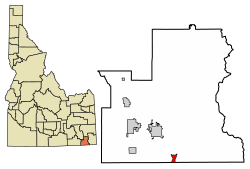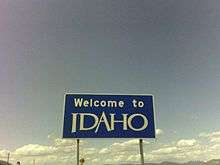Franklin, Idaho
Franklin is a city in Franklin County, Idaho, United States. The population was 641 at the 2010 census.[4] It is part of the Logan, Utah-Idaho Metropolitan Statistical Area.
Franklin, Idaho | |
|---|---|
 Street Scene in Franklin | |
 Location of Franklin in Franklin County, Idaho | |
| Coordinates: 42°0′58″N 111°48′11″W | |
| Country | United States |
| State | Idaho |
| County | Franklin |
| Founded | 1860 |
| Government | |
| • Mayor | Todd Hawkes (2018) |
| Area | |
| • Total | 1.33 sq mi (3.44 km2) |
| • Land | 1.30 sq mi (3.37 km2) |
| • Water | 0.03 sq mi (0.07 km2) |
| Elevation | 4,501 ft (1,372 m) |
| Population | |
| • Total | 641 |
| • Estimate (2019)[3] | 835 |
| • Density | 641.32/sq mi (247.60/km2) |
| Time zone | UTC-7 (Mountain (MST)) |
| • Summer (DST) | UTC-6 (MDT) |
| ZIP code | 83237 |
| Area code(s) | 208 |
| FIPS code | 16-28810 |
| GNIS feature ID | 0372775 |
| Website | franklinidaho |
History
The town was founded by Mormon pioneers led by Thomas S. Smart on April 14, 1860, in what was then Washington Territory, although at the time it was believed the settlement was within the bounds of Utah Territory. The town was named for Franklin Richards, an Apostle for The Church of Jesus Christ of Latter-day Saints.[5] Franklin is the first permanent European settlement in present-day Idaho. Its political status remained ambiguous until an 1872 survey determined the townsite was in Idaho Territory about 1-mile (1.6 km) north of the Utah Territory border.[6] The area within the town limits was platted into square blocks in 1864.[7]
Part of the 2004 comedy film Napoleon Dynamite were shot near Franklin. The chicken farm scenes were filmed on Ritewood Egg Farms property, and the supervisor's character is loosely based on Marlow Woodward, a late Franklin resident and one of the farm's founders.[8]

Geography
Franklin is located at 42°0′58″N 111°48′11″W (42.016039, -111.803101).[9] at an elevation of 4,501 feet (1,372 m) above sea level.
According to the United States Census Bureau, the city has a total area of 1.29 square miles (3.34 km2), of which, 1.26 square miles (3.26 km2) is land and 0.03 square miles (0.08 km2) is water.[10]
Demographics
| Historical population | |||
|---|---|---|---|
| Census | Pop. | %± | |
| 1900 | 435 | — | |
| 1910 | 534 | 22.8% | |
| 1920 | 589 | 10.3% | |
| 1930 | 531 | −9.8% | |
| 1940 | 523 | −1.5% | |
| 1950 | 467 | −10.7% | |
| 1960 | 446 | −4.5% | |
| 1970 | 402 | −9.9% | |
| 1980 | 423 | 5.2% | |
| 1990 | 478 | 13.0% | |
| 2000 | 641 | 34.1% | |
| 2010 | 641 | 0.0% | |
| Est. 2019 | 835 | [3] | 30.3% |
| U.S. Decennial Census[11] | |||
2010 census
As of the census[2] of 2010, there were 641 people, 221 households, and 155 families living in the city. The population density was 508.7 inhabitants per square mile (196.4/km2). There were 236 housing units at an average density of 187.3 per square mile (72.3/km2). The racial makeup of the city was 91.1% White, 0.5% African American, 0.5% Native American, 6.2% from other races, and 1.7% from two or more races. Hispanic or Latino of any race were 13.1% of the population.
There were 221 households, of which 42.5% had children under the age of 18 living with them, 62.4% were married couples living together, 5.0% had a female householder with no husband present, 2.7% had a male householder with no wife present, and 29.9% were non-families. 26.7% of all households were made up of individuals, and 12.2% had someone living alone who was 65 years of age or older. The average household size was 2.90 and the average family size was 3.61.
The median age in the city was 29.9 years. 34.3% of residents were under the age of 18; 9.8% were between the ages of 18 and 24; 23.9% were from 25 to 44; 19.2% were from 45 to 64; and 12.6% were 65 years of age or older. The gender makeup of the city was 49.8% male and 50.2% female.
2000 census
As of the census[12] of 2000, there were 641 people, 195 households, and 156 families living in the city. The population density was 839.0 people per square mile (325.6/km2). There were 219 housing units at an average density of 286.6 per square mile (111.3/km2). The racial makeup of the city was 88.92% White, 0.16% Native American, 9.05% from other races, and 1.87% from two or more races. Hispanic or Latino of any race were 9.67% of the population.
There were 195 households, out of which 47.7% had children under the age of 18 living with them, 69.2% were married couples living together, 5.1% had a female householder with no husband present, and 20.0% were non-families. 17.9% of all households were made up of individuals, and 10.8% had someone living alone who was 65 years of age or older. The average household size was 3.29 and the average family size was 3.79.
In the city, the population was spread out, with 40.1% under the age of 18, 8.9% from 18 to 24, 26.8% from 25 to 44, 14.7% from 45 to 64, and 9.5% who were 65 years of age or older. The median age was 26 years. For every 100 females, there were 94.2 males. For every 100 females age 18 and over, there were 101.0 males.
The median income for a household in the city was $33,026, and the median income for a family was $34,191. Males had a median income of $27,417 versus $24,000 for females. The per capita income for the city was $10,346. About 10.9% of families and 14.1% of the population were below the poverty line, including 19.0% of those under age 18 and 10.3% of those age 65 or over.
References
- "2019 U.S. Gazetteer Files". United States Census Bureau. Retrieved July 9, 2020.
- "U.S. Census website". United States Census Bureau. Retrieved 18 December 2012.
- "Population and Housing Unit Estimates". United States Census Bureau. May 24, 2020. Retrieved May 27, 2020.
- Spokesman-Review Archived 2016-03-04 at the Wayback Machine - 2010 census - Franklin, Idaho - accessed 26 December 2011
- The Utah Genealogical and Historical Magazine, Volumes 9-10. 1918. p. 128.
- Eldon T. Bennett (November 2004). "An Early History of Franklin". Franklinidaho.org. Archived from the original on 2012-07-10.
- William Fleuitt - History accessed 3 January 2018
- United Egg Producers article Archived 2009-09-14 at the Wayback Machine, accessed 27 September 2009.
- "US Gazetteer files: 2010, 2000, and 1990". United States Census Bureau. 12 February 2011. Retrieved 23 April 2011.
- "US Gazetteer files 2010". United States Census Bureau. Archived from the original on 2 July 2012. Retrieved 18 December 2012.
- "Census of Population and Housing". Census.gov. Retrieved 4 June 2015.
- "U.S. Census website". United States Census Bureau. Retrieved 31 January 2008.
Further reading
- IDAHO SEMI-CENTENNIAL CELEBRATION (1910), Idaho facts and statistics; pertaining to its early settlement and colonization with special reference to the Franklin Colony together with stories of the Indian troubles in the southeastern part of the state, Salt Lake City: IDAHO SEMI-CENTENNIAL CELEBRATION
External links
- Official website - City of Franklin